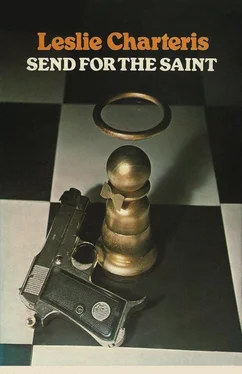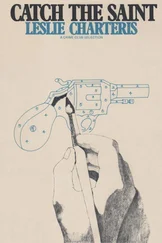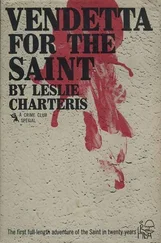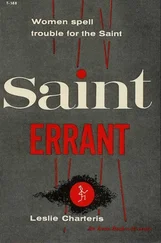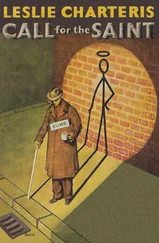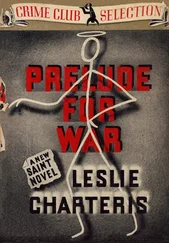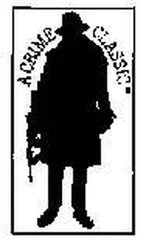And that was when Simon remembered the faint note of evasion that had crept into Pelton’s voice. Somewhere there had been something out of place, or out of tune, or micrometrically out of focus...
And then suddenly, before he had groped even halfway to an answer, he was chilled by an icy wind of apprehension; and he found himself almost by instinct steering the conversation towards its source.
“I’m afraid you’ll just have to use one of your own men after all,” he told Pelton in a voice that outran his conscious mind.
“But I daren’t,” Pelton said. “At least, not a frontline man. For all we know, Rockham may even have photos of some of our regular operators — courtesy of one of the Opposition’s intelligence. I can’t take that risk. Whereas you — your face would never be associated with us now. And besides, the cover I have in mind for you involves an element of disguise—”
“Well, if your infiltrator’s appearance is going to be altered anyway, I can’t see that there’d be any special risk of recognition,” Simon put in reasonably. “And as it happens Randall’s an expert in that line, as he proved in France. Why not let him have a crack at it? Or is he busy elsewhere?”
Pelton hesitated for a long moment; and when he spoke Simon knew that the evasion had been real.
“No, he’s not busy,” Pelton said with deliberate calm.
“Prepare yourself for a shock, Simon. I’m afraid Randall has already met The Squad.”
The Saint went very still.
“What’s happened to him?” he asked levelly; but he had a premonition of what the answer would be.
“Randall is dead. You’ll remember there always was a streak of recklessness in him. He insisted on going over the wall, down at Rockham’s HQ, to see what he could nose out. His body was fished out of the Thames a week ago. Unidentifiable — except by a secret mark known to us.
It was as if a photographic flash-bulb had been exploded in front of Simon Templar’s eyes. For a while he scarcely saw the man before him, and yet certain details registered mechanically on the film of his memory, so that as much as a year later he might have been able to picture accurately the exact shape of a patch of chipped-off paint on the skirting board beyond Pelton’s desk in that supremely unmemorable office.
He had worked with Randall. And then their paths had diverged, as men’s paths do. But to Simon Templar, Randall was a part of the memory of those days when he had found another kind of satisfaction, as complete in its way as any he had known before or since, when Simon and Randall and others had forged links of mutual respect and brotherhood amid the often hair-raising exigencies of their exploits with the French resistance workers. Frenchman and American and Briton had spoken for once in the same accents, the accents of determination and freedom. Men had been bonded then in a kind of loyalty that only the menace of a common enemy can cement; and it was understood as an inevitable fact of life, and not to be questioned, that when one brave man fell, any of his friends and comrades would step forward to take his place, with a purpose made only more firm by the knowledge of the risks involved...
And now Randall was dead.
It never even occurred to the Saint that he still had a choice. Almost mechanically, he repeated that the amount of the proffered fee was irrelevant, but said that he would take the job.
Only afterwards was it fully borne in upon him how skilfully Pelton had played the news of Randall’s death, like a high trump kept till the last card. He must have known enough about the kind of man Simon Templar was, and about his likely reactions, to be fairly doubtful of enlisting his aid, so he had saved his biggest gun for the moment when its effect would be most immediately and hopefully decisive.
This said something for Pelton’s strategic talents — which duly went up a couple of notches in the Saint’s estimation — but it also bespoke a degree of coldblooded calculation which cast doubt on his more sympathetic facade, which duly went down the same scale by a similar amount.
But that was after Simon had had a chance, later, to sit down and think about it soberly. At the time, he was carried along in the bitter wake of that final news of Randall. His concentration, once the initial shock had passed, was focused with a grim intensity on one thing and one thing only: the business of getting to grips with The Squad at once or if possible sooner. The Saint was spoiling for a fight, and he was in no mood to wait.
On that score as well as from his healthy aversion to being wrapped up in iron bars and concrete, he was about as far from overjoyed as it is possible to be when Pelton told him that his cover as George Gascott would take an absolute minimum of four weeks to establish, and that he would have to spend three of them in jail.
Patience had never been one of Simon Templar’s outstanding virtues. He was inclined to be impatient in particular with the way things are done in official, as opposed to privateering circles. It often seemed to him, setting aside exaggeration and trying to look at the matter with scrupulous objectivity, that the processes whereby officialdom ground out its slow results were mostly characterised by a degree of lead-footedness beside which a palsied geriatric snail battling through thick treacle against a strong headwind would have seemed to be positively zipping along.
Which is merely one way of pointing out that if The Squad had been purely the Saint’s own party, and Rockham’s base a private target for his own brand of freebooting vengeance, he would probably have figured out another way of setting about it.
However, given the central principle of an infiltrator, he had to admit that Pelton’s cover idea was a good one. And he had to agree, too, that a month was the least possible time it could take him to perfect himself in the role he had to play.
Nobody applied to join The Squad: Rockham selected. And the evidence was that anyone who got as far as a final interview and was then rejected, or turned the job down, found it extraordinary difficult to talk about it, on account of being dead.
Presumably Rockham made good use of certain official documents which were easily enough available to anyone who knew of their existence and only took the trouble to get hold of them. For a start, he would certainly study the periodic lists of newly released convicts and of dishonourable service discharges.
And presumably, too, he had access like the Saint to some of the shifting subterranean networks which carry information of a less official and more guarded kind. Doubtless he would usually come to hear of it before long when a potentially suitable man was, criminally speaking, at a loose end...
Anyhow, whatever his sources, Rockham managed to find a hunting ground of potential recruits. Within it he then applied his own rigorous standards of selection. Physical fitness and courage were not enough; and he only took men who gave evidence of having already developed the prime mercenary qualities — tough ruthlessness and unscrupulous venality — to an advanced level.
George Gascott matched up to the prescription very well. To be irresistible to Rockham, all the Saint had to do was step into Gascott’s identity.
Now in his late thirties, as a younger man George Gascott had held the King’s Commission in the Commandos for several years; until His Majesty decided, or someone decided on His Majesty’s behalf, that in spite of Captain Gascott’s undeniable military efficiency, the commission could be terminated with advantage to His Majesty, the Royal Marines, and the tax-paying public. Some of the latter’s money — by an ingenious and complicated inventory fraud involving non-existent equipment — had almost certainly found its way into the suave Gascott’s pockets. Though the fraud was technically unprovable, fortunately for His Majesty et al a fight in which Gascott half-killed a fellow officer supplied a good enough reason for a parting of the ways.
Читать дальше
